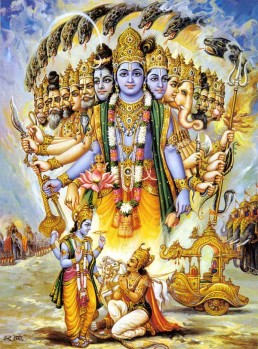Swami Chinmayananda Commentary
In this opening stanza, Arjuna expresses his complete satisfaction at the details regarding the glories of the Lord which were described in the previous chapter, Arjuna appreciated that so much labour was spent by Krishna only to bless his disciple and bring him out of delusion. To realise the unity in the diversity is to get an inoculation against the sorrows of plurality. The deft pen of Vyasa beautifully registers the effectiveness of the last chapter upon a sincere student when he makes Arjuna confess, “THIS, MY DELUSION, IS GONE.”
REMOVAL OF A DELUSION or a misunderstanding IS NOT IN ITSELF THE ACQUISITION OF KNOWLEDGE of the Real. Removal of delusion is one aspect of the process of knowing the Truth. Arjuna must be rightly feeling that his delusion — his firm faith in the separativeness of names and forms — can no longer hold its grounds when his intellect has been educated to look forward to, and detect the “presence” of the Divine in the very world of his perceptions. But at the same time, he has not gained any visible experience of the Unity in the diversity; he has no personal experience of the oneness of things and beings, although theoretically at least, his intellect has come to accept this inherent Oneness.
The Pandava Prince, Arjuna, realises that Krishna has so elaborately explained the theme in the previous chapter only “out of compassion towards me” (Mad-anugrahaya). This reminds us of Krishna using almost the same term (X-2) when He explains how He, abiding in the hearts of his devotees, destroys all their inner darkness born out of ignorance.
OUT OF COMPASSION FOR ARJUNA, WHAT WERE THE SUPREMELY PROFOUND WORDS THAT WERE GIVEN OUT BY THE LORD? LISTEN:
Adi Sankara Commentary
Arjuna said — To show favour to me, who is deluded by the misconception that the body is the self, these words of supreme mystery concerned with the self, i.e., which is a proper description of the self, have been spoken by You in words beginning from ‘There was never a time when I did not exist’ (2.12) and ending with, ‘Therefore, O Arjuna, become a Yogin’ (6.46). By that this delusion of mine about the self is entirely removed.
The Bhagavad Gita with the commentary of Sri Sankaracharya – Translated by Alladi Mahadeva Sastry
Holy Geeta – Commentary by Swami Chinmayananda
The Bhagavad Gita by Eknath Easwaran – Best selling translation of the Bhagavad Gita
The Bhagavad Gita – Translation and Commentary by Swami Sivananda
Bhagavad Gita – Translation and Commentary by Bhaktivedanta Swami Prabupadha
Srimad Bhagavad Gita Chapter 11 – Verse 1 – 11.1 madanugrahaya paramam – All Bhagavad Gita (Geeta) Verses in Sanskrit, English, Transliteration, Word Meaning, Translation, Audio, Shankara Bhashya, Adi Sankaracharya Commentary and Links to Videos by Swami Chinmayananda and others – 11-1

